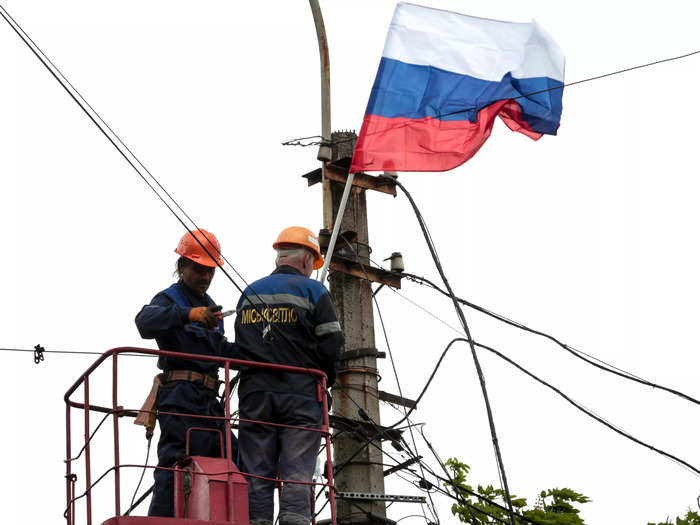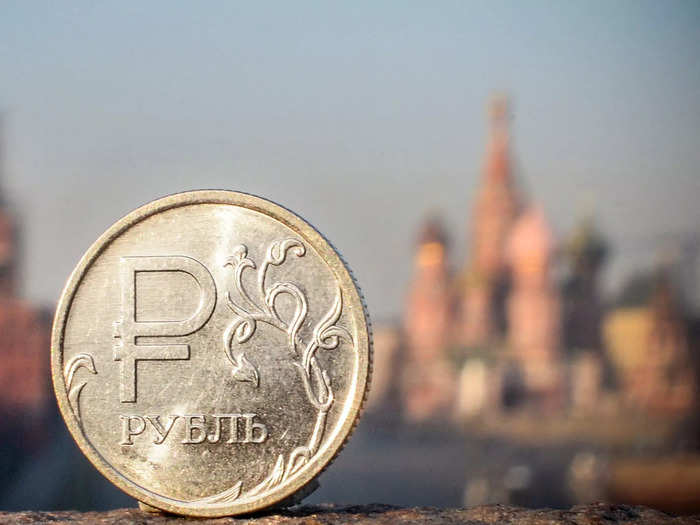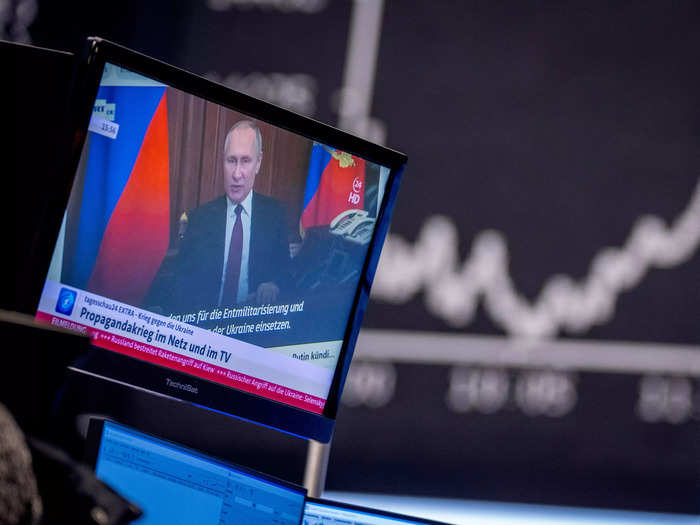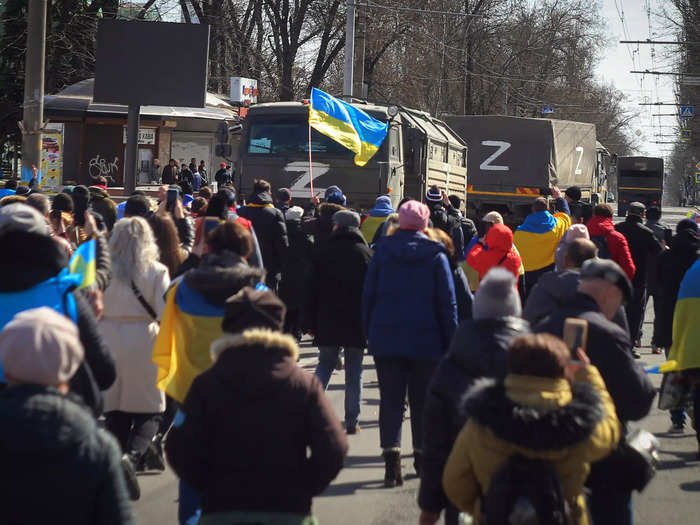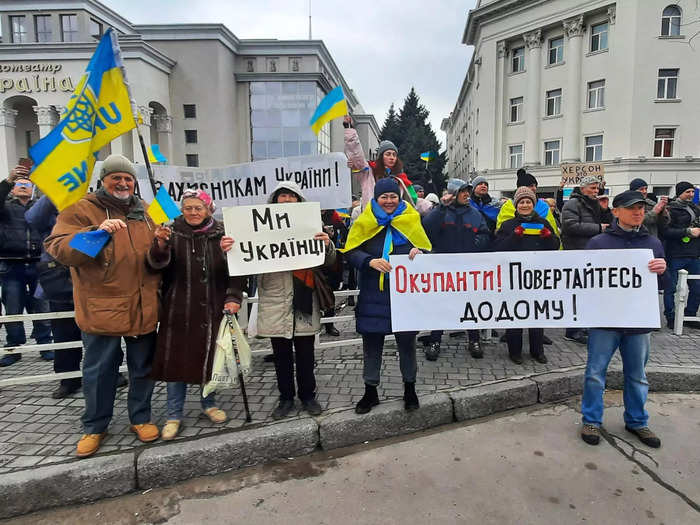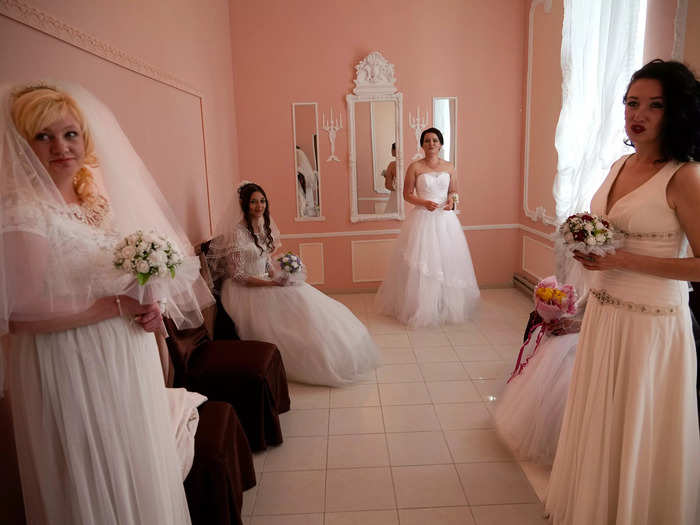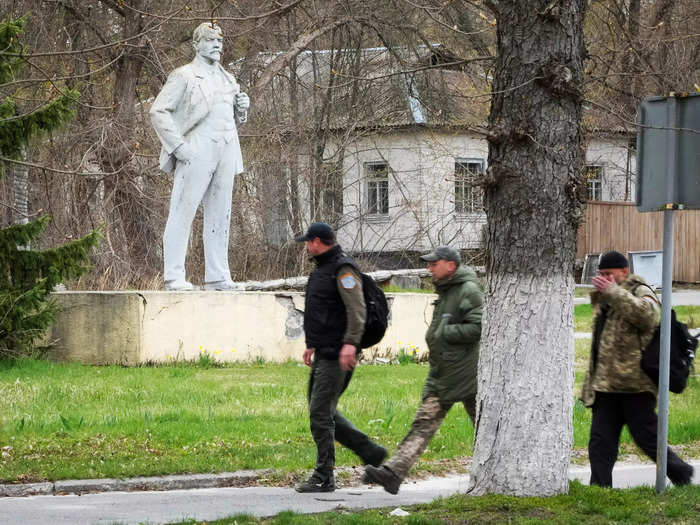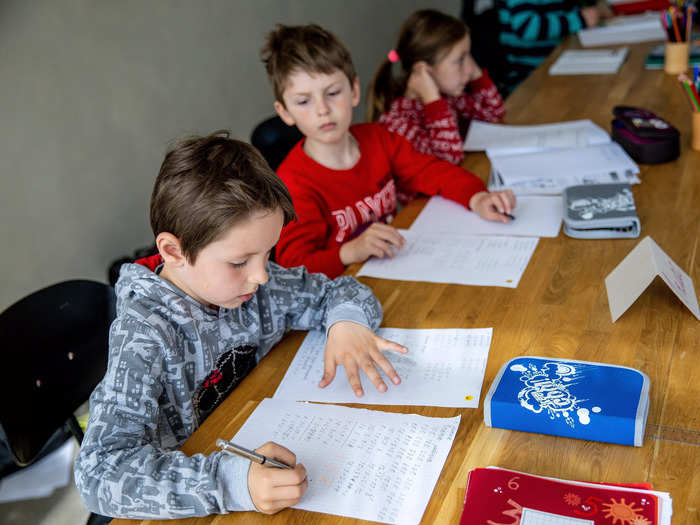Municipal workers attach a Russian national flag to a pole preparing to celebrate 77 years of the victory in WWII in Mariupol, in territory under the government of the Donetsk People's Republic, eastern Ukraine, Thursday, May 5, 2022.AP Photo
- Russian authorities are attempting to strip occupied Ukraine of its national culture.
- Russia has installed its flags, monuments, and politicians in several Ukrainian cities and towns.
Amid the ongoing violence of war, Russian President Vladimir Putin's apparent long game in Ukraine — a nefarious attempt to assert total and long-term control on the neighboring country — is coming into clear view.
From the introduction of Russian currency to the complete shuttering of Ukrainian broadcasting, the Kremlin is taking extreme measures to make Ukrainian towns look, feel, and operate like Russia.
Prior to the start of the war, Putin erroneously claimed that Ukraine was not an independent state, baselessly arguing that the country was a creation of the Soviet Union and part of Russia's historic territory.
Now, as Russia's invasion stretches into its third month, it seems Putin is aiming to make his claims a reality.
Russia has begun installing its flags in besieged Ukrainian cities.
Municipal workers attach a Russian national flag to a pole preparing to celebrate 77 years of the victory in WWII in Mariupol, in territory under the government of the Donetsk People's Republic, eastern Ukraine, Thursday, May 5, 2022. AP Photo
Despite several military setbacks and embarrassments over the past 10 weeks, Russia has slowly gained control of a significant portion of Ukraine's territory in the south and the east.
As Russia looks to cement its stronghold on the captured Ukrainian cities, Russian authorities and their local proxies have begun removing the blue and yellow Ukrainian flags adorning government buildings and city squares and replacing them with Russian and Soviet flags.
Last week, Russia said it would replace Ukrainian currency with the Russian ruble in the occupied city of Kherson.
A Russian ruble coin is pictured in front of the Kremlin in central Moscow, on April 28, 2022. Photo by ALEXANDER NEMENOV/AFP via Getty Images
Russian state media announced last week that it would transition the occupied city of Kherson to rubles, replacing the Ukrainian hryvnia.
The currency transition is expected to take up to four months.
Kherson, located 200 kilometers east of Odesa near the Black Sea, was the first Ukrainian city to fall to Russian forces in early March.
In the early days of the invasion, the ruble's worth plummeted to less than one penny, but the currency has since made a comeback as the Kremlin works to prop up the coin, demanding that Russian energy customers make payments using rubles.
"Using the Russian ruble is a way of emphasizing Russia's dominance over everyday life and to get citizens used to the idea," Emily Ferris, a research fellow at the Royal United Services Institute, a defense and security think tank in London, told NBC News.
The Kherson region has been hit with widespread internet and cell service outages, but Russian state television is easily accessible.
Russia's President Vladimir Putin appears on a television screen at the stock market in Frankfurt, Germany, Feb. 25, 2022. AP Photo/Michael Probst, File
Russia has attacked Kherson's telecom towers, bringing the city to its knees by controlling what information is disseminated and isolating it from the rest of the world.
Amid ongoing internet and cell service outages, Russian authorities have made sure Ukrainian residents in the city do have access to Russian state TV channels, which began broadcasting there last month.
Russian state media is a prime source of Kremlin propaganda, which is aiming to convince Kherson's residents that all is well in the occupied city, thanks to Russian troops.
Rumors of an upcoming sham referendum to create the People's Republic of Kherson have residents worried.
People with Ukrainian flags walk towards Russian army trucks during a rally against the Russian occupation in Kherson, Ukraine, Sunday, March 20, 2022. AP Photo/Olexandr Chornyi
Reports suggest Russia has plans to stage a bogus referendum in the Kherson region, allowing Moscow to cement its hold on the area by establishing a "breakaway region."
Intelligence from Ukraine and its allies indicate that Russia could soon hold the referendum to either create the "People's Republic of Kherson" in the same vein as the pro-Russia breakaway territories of Donetsk and Luhansk in eastern Ukraine or annex the region entirely, like it did to Crimea in 2014.
Multiple local Ukrainian politicians have been purged and replaced with pro-Russia puppets.
People hold Ukrainian flags and banners that read: "We are Ukrainians", centre, and "Occupiers! Return home!" during a rally against the Russian occupation in Svobody (Freedom) Square in Kherson, Ukraine, Saturday, March 5, 2022. AP Photo/Olexandr Chornyi
Last month, Russia replaced the mayor of Henichesk, a seaside town in the occupied Kherson region, with a pro-Russian puppet leader.
The former Ukrainian mayor of Henichesk, Oleksandr Tulupov, was last seen on March 9, according to The Guardian, posing for a photo in a town park with friends. It is unclear the current fate of Tulupov.
The Russians hacked into Henichesk's government website and said Tulupov voluntarily "resigned," the outlet reported. He has since been replaced with a new mayor, Gennady Sivak, who spent the last eight years in Russia-annexed Crimea.
Meanwhile, late last month, Kherson's mayor was relieved of duty, and replaced by Igor Katsyukevich, a Russian deputy from Putin's party, according to The Guardian.
The Wall Street Journal reported earlier this month that nearly all of the elected mayors in towns and villages that have been occupied by Russia have since been replaced by Russian military appointees.
A city-run wedding hall in Berdyansk is issuing newlyweds wedding certificates from the Russian Federation.
Brides wait to attend a wedding ceremony of several pairs in the center of Berdyansk, in territory under the government of the Donetsk People's Republic, eastern Ukraine, Saturday, April 30, 2022. This photo was taken during a trip organized by the Russian Ministry of Defense. AP Photo
A wedding hall in the port city of Berdyansk, located in the Zaporizhzhia region of Ukraine, is issuing Russian Federation wedding certificates to all newlyweds, according to The Wall Street Journal.
A photo of the renovated registry office shows a Russian flag hanging among flowers.
A statue of Soviet leader Vladimir Lenin was erected in the town of Henichesk last month.
People pass a monument to Soviet Union founder Vladimir Lenin in Chernobyl, Ukraine, Saturday, April 16, 2022. AP Photo/Efrem Lukatsky
Despite a recent countrywide effort to remove Soviet monuments from Ukraine's public places, statues of Vladimir Lenin are now popping up across the country following Russia's invasion.
Following the Maidan revolution in 2014, which saw deadly clashes between Ukrainian protesters and authorities that ultimately led to the ousting of President Viktor Yanukovych, Kyiv removed the majority of its Lenin statues and Soviet monuments.
But last month, a towering figure of Soviet leader Vladimir Lenin popped up in Henichesk, outside the city's main council building, according to The Guardian.
Then, one week later, Russian occupiers erected another Lenin statue in Nova Kakhovka, also in Kherson Oblast, according to The Kyiv Independent.
"Because modern Russia stands for nothing except corruption, nihilism, and Putin's personal power, they have brought back Soviet flags as well as Lenin statues to symbolise Russian victory," Anne Applebaum told The Guardian.
There are reports that Ukrainian school children in Ukraine's Donetsk region are being told to write on their notebook that they are in Russia.
Schoolchildren who recently fled war-torn Ukraine attend Ukrainian primary school education at the "Classroom for Ukraine" project on April 28, 2022 in Berlin, Germany. Photo by Maja Hitij/Getty Images
Young students in the Mangush and Nikolskoye districts of Ukraine's Donetsk region have been told to write on their notebooks that they are in the Rostov region — a Russian federal district, according to The Insider, which cited Telegram reports from Ukrainian officials.
"Now schoolchildren in the Mangush and Nikolskoye districts are also told to write 'Rostov region' on their notebooks," Peter Andryushchenko, an adviser to the Mariupol mayor said.

